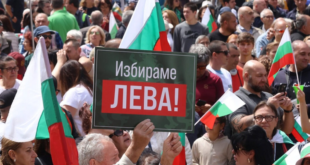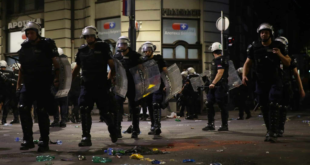In November 2001, the Special Operations Unit, a Serbian State Security special forces unit, staged an armed mutiny and blocked highways, saying that they wanted the government to stop extraditing Serbs to the UN war crimes court in The Hague.
Looking back almost 20 years later, veteran journalist Milos Vasic told BIRN in an interview that the incident should have been recognised at the time as the “next step” in a chain of events that ultimately led to the assassination of Serbian Prime Minister Zoran Djindjic on March 12, 2003.
On the same day as the mutiny, Milorad ‘Legija’ Ulemek, the commander of the Special Operations Unit, had been due to testify in court about the attempted murder two years earlier of opposition party leader Vuk Draskovic, allegedly by Special Operations Unit and State Security operatives.
“I interpreted that as a threat [to the authorities],” Vasic said.
But the response to the mutiny from the coalition government led by Djindjic was weak, he argued.
“I know for sure that elements of the military police and the 63rd Parachute Brigade were deployed in the area and ready to disarm and break up the ‘gang’”, he said, but the government opposed the intervention.
Asked whether it was possible that members of the government did not understand what kind of problem the Special Operations Unit represented, Vasic responded that they failed to see reality.
“Everyone was blind,” he said. “At one point, I asked Ceda [Cedomir] Jovanovic [then a key ally of Djindjic]: ‘Why didn’t you break up the gang immediately, after the rebellion? You simply abolish the unit, disarm its members and send them away to their houses.’
“And Ceda tells me this: ‘We all thought, maybe we will need them for something.’ And I think that Ceda was right – he was telling the truth.”
Jovanovic later said that it was “indisputable” that the mutiny was “a prelude to destabilise the country, which resulted directly in the murder of Prime Minister Zoran Djindjic”.
He also insisted that the real motive for the mutiny was “an attempt to hide the criminal activities of the unit” – not to stop Serbs being sent to The Hague. Vasic has a similar opinion, saying the purported Hague motive was “bullshit”.
The mutiny ended when the government promised to make changes at the top of the State Security Service, and Milorad Bracanovic, a close associate of Ulemek, was appointed as its deputy chief.
Sixteen months later, Djindjic was shot dead. Ulemek and other Special Operations Unit organised the assassination in collaboration with a powerful criminal gang called the Zemun Clan.
A massive crackdown by the authorities involving hundreds of arrests led to the convictions of 12 Special Operations Unit and Zemun Clan members, including Ulemek, and the disbanding of the unit.
‘The court can’t get them’
Vasic was speaking to BIRN ahead of the annual commemoration in Belgrade on Friday of the anniversary of the killing of Djindjic, who was the first prime minister of a democratic government in Serbia since World War II and came to office after authoritarian Yugoslav President Slobodan Milosevic was ousted in 2000.
Vasic has been covering Serbian politics since the 1970s. He first worked for news magazine NIN and then, with a group of journalistic colleagues, established the weekly magazine Vreme, which became one of the most important independent media outlets during the rule of Milosevic and in the years afterwards when it came to reporting on war crimes, organised crime, corruption and other important issues that affected Serbian society. Vasic was also one of the few journalists in Serbia who reported intensively on the activities of the Special Operations Unit.
The change of power in 2000 in Serbia had mainly happened on the political level, and much of the police, military and intelligence services, who had been responsible for all kinds of crimes under Milosevic during the war years of the 1990s, remained practically intact. This also applied to State Security and the Special Operations Unit, and the failure to deal with it had deadly consequences for Djindjic.
Vasic recalled how the Special Operations Unit was officially set up in 1996, although a similar Serbian unit known as the Red Berets had been operating since 1991 in the war in Croatia and then in Bosnia and Herzegovina, under the control of State Security chief Jovica Stanisic and his deputy Franko ‘Frenki’ Simatovic.
Stanisic and Simatovic are currently being retried at the UN court in The Hague for their alleged participation in a joint criminal enterprise led by Milosevic, aimed at permanently and forcibly removing Croats and Bosniaks from large parts of Croatia and Bosnia and Herzegovina to achieve Serb domination. To achieve this, they used paramilitary units such as the Red Berets, Arkan’s Tigers or the Scorpions, the indictment claims.
“The Special Operations Unit is their [Stanisic and Simatovic’s] baby,” said Vasic. “In 1996 they transferred the useful element of those paramilitary monkeys [into the officially-established Special Operations Unit]. When I say useful, I mean in terms of their psychological and physical capabilities.”
Stanisic and Simatovic were acquitted in their original trial in The Hague and pleaded not guilty again in their second trial. The final verdict is due in May and Vasic thinks they might be cleared again because the UN court “can’t get them on anything”.
“Now personally, I’m not sure that Jovica and Frenki will be convicted, it’s a thin case. Jovica and Frenki should be held responsible for various things here [in Serbia], not in The Hague. But we won’t live long enough to see it, forget that,” he said.
‘Let’s find the corpses’
Vasic retired three years ago after decades in journalism but has continued to follow current events and politics closely. When BIRN visited him, he was watching television reports on the arrests of members of an alleged organised crime gang led by a Serbian football hooligan.
Dozens of people have been arrested in a police crackdown that pro-government media have compared to the massive operation staged after the assassination of Djindjic.
The crackdown followed allegations by Serbia’s strongman President Aleksandar Vucic that his telephone conversations had been bugged. Unsubstantiated claims were made that police or security service officials were involved in the illegal wiretapping, and that there might have been a plot to assassinate Vucic.
Some tabloids have compared the criminal gang allegedly led by hooligan Veljko Belivuk to the Zemun Clan that was involved in killing Djindjic, but Vasic is sceptical.
“They are street guys, small-time street dealers and small-time street thugs, so now we just need to see how many dead bodies they have on their consciences – there are various suspicions, from eight to ten; let’s find the corpses then,” he said.
 Eurasia Press & News
Eurasia Press & News



